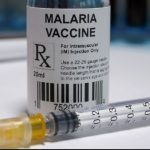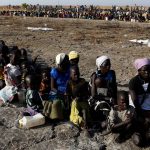Three men working as porters for the U.N.’s World Food Programme were killed in ethnic violence in South Sudan‘s Wau city earlier this week, the organisation said on Friday, the latest violence against humanitarian workers in the famine-hit nation.
They were among at least 16 civilians killed when soldiers blocked off roads in the northwestern city of Wau and militias aligned to the government went house-to-house, killing people from minority tribes on Monday.
“Two died of machete wounds and the third was shot,” WFP said in a statement.
The men appear to have been killed on Monday as they tried to make their way to a WFP warehouse, it said.
Local media have reported a higher death toll from the violence in Wau but it is difficult for reporters to reach the city and local authorities and aid agencies are unwilling to comment.
Violence against aid workers is increasingly common in oil-rich South Sudan, which is suffering the world’s first famine for six years. Six aid workers were killed in an ambush last week and 79 have been killed since the civil war began.
The conflict in the world’s youngest nation erupted when the president fired his deputy in 2013, sparking a confrontation between two of the country’s largest ethnic groups.
Since then, the conflict has broadened and fragmented, drawing in a number of smaller ethnic groups and dividing some of the larger ones
Three men working as porters for the U.N.’s World Food Programme were killed in ethnic violence in South Sudan‘s Wau city earlier this week, the organisation said on Friday, the latest violence against humanitarian workers in the famine-hit nation.
They were among at least 16 civilians killed when soldiers blocked off roads in the northwestern city of Wau and militias aligned to the government went house-to-house, killing people from minority tribes on Monday.
“Two died of machete wounds and the third was shot,” WFP said in a statement.
The men appear to have been killed on Monday as they tried to make their way to a WFP warehouse, it said.
Local media have reported a higher death toll from the violence in Wau but it is difficult for reporters to reach the city and local authorities and aid agencies are unwilling to comment.
Violence against aid workers is increasingly common in oil-rich South Sudan, which is suffering the world’s first famine for six years. Six aid workers were killed in an ambush last week and 79 have been killed since the civil war began.
The conflict in the world’s youngest nation erupted when the president fired his deputy in 2013, sparking a confrontation between two of the country’s largest ethnic groups.
Since then, the conflict has broadened and fragmented, drawing in a number of smaller ethnic groups and dividing some of the larger ones
Three men working as porters for the U.N.’s World Food Programme were killed in ethnic violence in South Sudan‘s Wau city earlier this week, the organisation said on Friday, the latest violence against humanitarian workers in the famine-hit nation.
They were among at least 16 civilians killed when soldiers blocked off roads in the northwestern city of Wau and militias aligned to the government went house-to-house, killing people from minority tribes on Monday.
“Two died of machete wounds and the third was shot,” WFP said in a statement.
The men appear to have been killed on Monday as they tried to make their way to a WFP warehouse, it said.
Local media have reported a higher death toll from the violence in Wau but it is difficult for reporters to reach the city and local authorities and aid agencies are unwilling to comment.
Violence against aid workers is increasingly common in oil-rich South Sudan, which is suffering the world’s first famine for six years. Six aid workers were killed in an ambush last week and 79 have been killed since the civil war began.
The conflict in the world’s youngest nation erupted when the president fired his deputy in 2013, sparking a confrontation between two of the country’s largest ethnic groups.
Since then, the conflict has broadened and fragmented, drawing in a number of smaller ethnic groups and dividing some of the larger ones
Three men working as porters for the U.N.’s World Food Programme were killed in ethnic violence in South Sudan‘s Wau city earlier this week, the organisation said on Friday, the latest violence against humanitarian workers in the famine-hit nation.
They were among at least 16 civilians killed when soldiers blocked off roads in the northwestern city of Wau and militias aligned to the government went house-to-house, killing people from minority tribes on Monday.
“Two died of machete wounds and the third was shot,” WFP said in a statement.
The men appear to have been killed on Monday as they tried to make their way to a WFP warehouse, it said.
Local media have reported a higher death toll from the violence in Wau but it is difficult for reporters to reach the city and local authorities and aid agencies are unwilling to comment.
Violence against aid workers is increasingly common in oil-rich South Sudan, which is suffering the world’s first famine for six years. Six aid workers were killed in an ambush last week and 79 have been killed since the civil war began.
The conflict in the world’s youngest nation erupted when the president fired his deputy in 2013, sparking a confrontation between two of the country’s largest ethnic groups.
Since then, the conflict has broadened and fragmented, drawing in a number of smaller ethnic groups and dividing some of the larger ones
Three men working as porters for the U.N.’s World Food Programme were killed in ethnic violence in South Sudan‘s Wau city earlier this week, the organisation said on Friday, the latest violence against humanitarian workers in the famine-hit nation.
They were among at least 16 civilians killed when soldiers blocked off roads in the northwestern city of Wau and militias aligned to the government went house-to-house, killing people from minority tribes on Monday.
“Two died of machete wounds and the third was shot,” WFP said in a statement.
The men appear to have been killed on Monday as they tried to make their way to a WFP warehouse, it said.
Local media have reported a higher death toll from the violence in Wau but it is difficult for reporters to reach the city and local authorities and aid agencies are unwilling to comment.
Violence against aid workers is increasingly common in oil-rich South Sudan, which is suffering the world’s first famine for six years. Six aid workers were killed in an ambush last week and 79 have been killed since the civil war began.
The conflict in the world’s youngest nation erupted when the president fired his deputy in 2013, sparking a confrontation between two of the country’s largest ethnic groups.
Since then, the conflict has broadened and fragmented, drawing in a number of smaller ethnic groups and dividing some of the larger ones
Three men working as porters for the U.N.’s World Food Programme were killed in ethnic violence in South Sudan‘s Wau city earlier this week, the organisation said on Friday, the latest violence against humanitarian workers in the famine-hit nation.
They were among at least 16 civilians killed when soldiers blocked off roads in the northwestern city of Wau and militias aligned to the government went house-to-house, killing people from minority tribes on Monday.
“Two died of machete wounds and the third was shot,” WFP said in a statement.
The men appear to have been killed on Monday as they tried to make their way to a WFP warehouse, it said.
Local media have reported a higher death toll from the violence in Wau but it is difficult for reporters to reach the city and local authorities and aid agencies are unwilling to comment.
Violence against aid workers is increasingly common in oil-rich South Sudan, which is suffering the world’s first famine for six years. Six aid workers were killed in an ambush last week and 79 have been killed since the civil war began.
The conflict in the world’s youngest nation erupted when the president fired his deputy in 2013, sparking a confrontation between two of the country’s largest ethnic groups.
Since then, the conflict has broadened and fragmented, drawing in a number of smaller ethnic groups and dividing some of the larger ones
Three men working as porters for the U.N.’s World Food Programme were killed in ethnic violence in South Sudan‘s Wau city earlier this week, the organisation said on Friday, the latest violence against humanitarian workers in the famine-hit nation.
They were among at least 16 civilians killed when soldiers blocked off roads in the northwestern city of Wau and militias aligned to the government went house-to-house, killing people from minority tribes on Monday.
“Two died of machete wounds and the third was shot,” WFP said in a statement.
The men appear to have been killed on Monday as they tried to make their way to a WFP warehouse, it said.
Local media have reported a higher death toll from the violence in Wau but it is difficult for reporters to reach the city and local authorities and aid agencies are unwilling to comment.
Violence against aid workers is increasingly common in oil-rich South Sudan, which is suffering the world’s first famine for six years. Six aid workers were killed in an ambush last week and 79 have been killed since the civil war began.
The conflict in the world’s youngest nation erupted when the president fired his deputy in 2013, sparking a confrontation between two of the country’s largest ethnic groups.
Since then, the conflict has broadened and fragmented, drawing in a number of smaller ethnic groups and dividing some of the larger ones
Three men working as porters for the U.N.’s World Food Programme were killed in ethnic violence in South Sudan‘s Wau city earlier this week, the organisation said on Friday, the latest violence against humanitarian workers in the famine-hit nation.
They were among at least 16 civilians killed when soldiers blocked off roads in the northwestern city of Wau and militias aligned to the government went house-to-house, killing people from minority tribes on Monday.
“Two died of machete wounds and the third was shot,” WFP said in a statement.
The men appear to have been killed on Monday as they tried to make their way to a WFP warehouse, it said.
Local media have reported a higher death toll from the violence in Wau but it is difficult for reporters to reach the city and local authorities and aid agencies are unwilling to comment.
Violence against aid workers is increasingly common in oil-rich South Sudan, which is suffering the world’s first famine for six years. Six aid workers were killed in an ambush last week and 79 have been killed since the civil war began.
The conflict in the world’s youngest nation erupted when the president fired his deputy in 2013, sparking a confrontation between two of the country’s largest ethnic groups.
Since then, the conflict has broadened and fragmented, drawing in a number of smaller ethnic groups and dividing some of the larger ones











